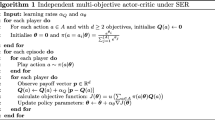Abstract
So far, most equilibrium concepts in game theory require that the rewards and actions of the other agents are known and/or observed by all agents. However, in real life problems, agents are generally faced with situations where they only have partial or no knowledge about their environment and the other agents evolving in it. In this context, all an agent can do is reasoning about its own payoffs and consequently, cannot rely on classical equilibria through deliberation, which requires full knowledge and observability of the other agents. To palliate to this difficulty, we introduce the satisfaction principle from which an equilibrium can arise as the result of the agents’ individual learning experiences. We define such an equilibrium and then we present different algorithms that can be used to reach it. Finally, we present experimental results that show that using learning strategies based on this specific equilibrium, agents will generally coordinate themselves on a Pareto-optimal joint strategy, that is not always a Nash equilibrium, even though each agent is individually rational, in the sense that they try to maximize their own satisfaction.
This research was supported in part by the Natural Science and Engineering Council of Canada (NSERC).
Preview
Unable to display preview. Download preview PDF.
Similar content being viewed by others
References
Harsanyi, J.: Games of incomplete information played by bayesian players. Management Science 14, 159–182, 320–334, and 486–502 (1967)
Dekel, E., Fudenberg, D., Levine, D.K.: Learning to play bayesian games. Games and Economic Behavior 46, 282–303 (2004)
Ross, S., Chaib-draa, B.: Report on satisfaction equilibria. Technical report, Laval University, Department of Computer Science and Software Engineering (2005), http://www.damas.ift.ulaval.ca/~ross/ReportSatisfactionEquilibria.pdf
Author information
Authors and Affiliations
Editor information
Editors and Affiliations
Rights and permissions
Copyright information
© 2006 Springer-Verlag Berlin Heidelberg
About this paper
Cite this paper
Ross, S., Chaib-draa, B. (2006). Satisfaction Equilibrium: Achieving Cooperation in Incomplete Information Games. In: Lamontagne, L., Marchand, M. (eds) Advances in Artificial Intelligence. Canadian AI 2006. Lecture Notes in Computer Science(), vol 4013. Springer, Berlin, Heidelberg. https://doi.org/10.1007/11766247_6
Download citation
DOI: https://doi.org/10.1007/11766247_6
Publisher Name: Springer, Berlin, Heidelberg
Print ISBN: 978-3-540-34628-9
Online ISBN: 978-3-540-34630-2
eBook Packages: Computer ScienceComputer Science (R0)




